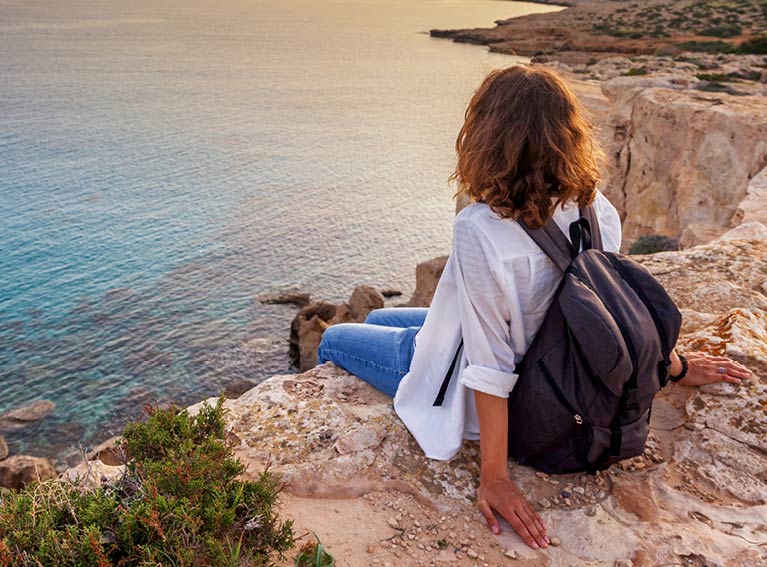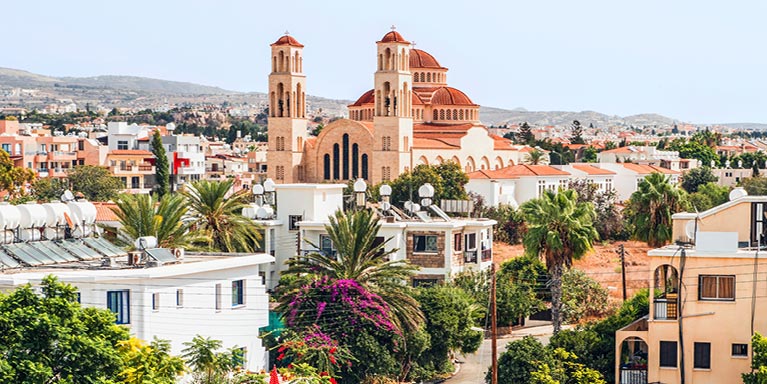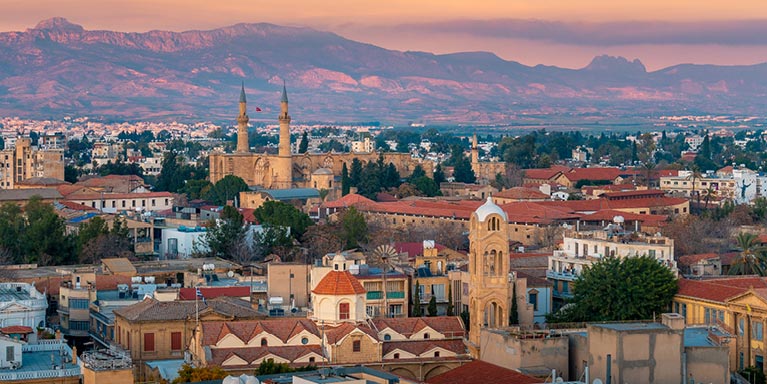
A guide to Cyprus
Our expert view on expat life in a country with a high standard of living

The Mediterranean sun, breathtaking scenery and low cost of living are just some of the reasons expats choose to make Cyprus their home. And it's become a popular choice for retirees leaving the nine to five.
Over three-million tourists visit the island every year to explore its ancient archaeological sites and enjoy its sun, sea and sand. It has good healthcare, low crime rates and a slow pace of life.
In this guide, we’ll look at the things that are good to know to help you settle quickly into your new life. And, if you’re thinking of moving abroad, we’ll be by your side as you embark on your latest adventure.
- Population: Around 1.2 million
- Currency: Euro (EUR)
- Capital: Nicosia
- Biggest city: Nicosia
- Main language: Greek, Turkish and English
- Main religion: Orthodox Christian
- Political system: Presidential republic
- International dialling code: +357
- Emergency services: 112 for police, fire and ambulance
- Driving: On the left
-
Careers
There are many job opportunities in IT, finance, business, and the energy sector. Tourism accounts for a large chunk of the economy and the expats who aren’t retired tend to work in service and hospitality roles, which are usually seasonal.
Larger cities offer more corporate opportunities. Nicosia, in particular, has a thriving financial hub. Face-to-face interactions are favoured in Cyprus, so networking and word of mouth can be useful ways to boost your chances of employment. Online job sites are a good place to start your search.
It’s a good idea to be able to speak some Greek, even if most people are fluent in English. And it’s worth bearing in mind that the working culture can be quite strict, with punctuality and following rules valued highly.
Education
Cyprus has a combination of state, private and international schools. It’s free for expat children to attend state school in Cyprus, although English isn’t the first language and consistency can be hit and miss.
Many expat families opt for private or international schools, which can be costly. In 2024, the cost of tuition per year could be between EUR5,000 and 9,000. But if you’re planning to return home in a few years, an international school will allow your children to follow a consistent curriculum throughout their education.
Other benefits of international schools include smaller class sizes, excellent facilities, and access to a range of extra-curricular activities. There are many international schools to choose from in Limassol, Nicosia and Paphos.
-
Moving money
Putting the right banking arrangements in place is vital for expats around the world. You want to be able to access and transfer money easily, and with a bank you can trust to comply with international regulations. Most people have two banks – one in their home country and one local to where they’re living. But, if your bank has a global network, you may be able to set up an account ahead of your arrival, which gives you time to assess the financial market.
It’s important to understand how foreign exchange works and how fluctuating exchange rates can affect you. When you’re juggling finances in multiple currencies, remember that the currency markets can move quickly and make a big difference to the value of your money.
To help you reduce the risk of fluctuating currency, you could choose a foreign exchange that lets you fix an exchange rate for a fixed period. Then you’ll know exactly how much you need to convert, whatever happens in the market.
Budgeting
When you’re looking to move to a new country, you need to consider how a change in the cost of living could affect your finances. If you’re moving with your job, sometimes your employer may help with expenses, such as accommodation or school fees. Remember to account for setup costs, such as buying furniture and sorting insurance, when you’re thinking about your budget.
Costs
Some of our offshore accounts have a monthly fee, such as the International Current Account, whereas others, like the Premier International Account, don’t. Both offer fee free International Payments (correspondent and recipient bank charges may apply) and 24/7 worldwide access. Plus, the Premier also includes worldwide travel insurance for you and your family, which is underwritten by AWP P&C SA and administered by Allianz Assistance, which is a trading name of AWP Assistance UK Ltd. Eligibility criteria, terms and conditions apply.
Financial planning
While it’s going to be a busy time, it’s also worth setting some time aside to review your financial plans, such as whether you want to open any offshore accounts. They offer the convenience of keeping your money in one place, so you can stay with the same bank no matter where life takes you.
Your expat status could give you new opportunities that weren’t available to you at home. However, tax rules differ from country to country, so if you’re unsure about your personal tax obligations, you should seek professional advice.
Lloyds Bank International Private Banking is by your side every step of the journey as you start your new life abroad. We offer international knowledge, experience and dedicated expert support to help meet all your financial needs. From savings to international payments and transfers, we can help you navigate the complex world of wealth management away from home.
Security
Offshore accounts are not protected by the Financial Services Compensation Scheme (FSCS), which protects savings up to £120,000 with authorised UK banks and building societies.
However, our accounts are covered by other schemes. The Jersey Bank Depositor Compensation Scheme, the Isle of Man Depositors’ Compensation Scheme and the Guernsey Banking Deposit Compensation Scheme offer protection for eligible deposits of up to £50,000.
Tax
Tax in the south of Cyprus
There are significant tax benefits for expats living in the south of Cyprus, especially for retirees and those setting up a business. First, you have to become a tax resident.
Qualifying as a tax resident
To become a tax resident, you must spend more than 183 days in any calendar year in Cyprus. You can also qualify if you spend 60 days in Cyprus, while not being a tax resident anywhere else, and not spending more than 183 days in any other country.”
The Double Tax Treaty system
Cyprus operates a Double Tax Treaty (DTT) with more than 60 countries, which means you’ll never pay tax twice on the same income. Depending on the conditions of the DTT, you’ll either pay tax on certain incomes from your country of residence or country of domicile, but never on both.
Pension income
There are two options for pensioners retiring to Cyprus:
1. Pay a fixed tax rate of 5% a year on pension income for amounts over 3,420 EUR.
2. Opt for Cyprus’s tiered income tax system.
The option you choose will depend on the income you have. It might be worth getting financial advice or guidance before deciding what to do, to make sure you fully benefit from the taxation rules.”
Income tax for expats in south Cyprus
The tax-free allowance for expats on income is 19,500 EUR. After that, income is taxed on a tiered basis.
The tiers are 20%, 25%, 30% and the maximum is 35%. The amount you’ll be taxed depends on the amount of your income.
Business tax
Corporate tax is currently 12.5% on profits.
Accommodation
The cost of accommodation in Cyprus depends on the location and type of property. You’ll find everything from new-build villas and city centre apartments to rustic dwellings that need some renovation.
On the whole, rental accommodation is cheaper than it is in the rest of Europe. A one-bed apartment in 2024 could cost anywhere between €500 and €2,000 a month.
Buying is comparable to other countries, with an average house price in 2024 of around €215,000. You might also find properties below €100,000 in some of the smaller villages.
When it comes to location, many expats find their way to Paphos on the southwest coast. The outlying villages of Peyia and Tala are particularly popular. Apart from the modern transport links to the rest of the island and an airport just 10 miles away, the quaint villages and wide beaches also appeal to those seeking to relocate.
Cyprus’s capital is often overlooked as a destination for expats. But it shouldn’t be. Nicosia is a cosmopolitan business hub about an hour from the coast. Because of that, it’s off the tourist radar and offers a more authentic experience than some of the more visited locations. It has the same modern infrastructure you’d expect to see in any city – schools, businesses, restaurants, hospitals and shops – but with a lower price tag than other capitals.
Limassol district is one of the largest cities in Cyprus and has a thriving business district, which attracts expats. And Larnaca is also a popular destination for those who prefer a slower pace, beautiful beaches, and historical sites.
Arts
The story of the island’s six-thousand-year history is told through the art, folklore and ancient sites that can be explored in its galleries, museums and culture trails. And, for breathtaking views of Cyprus, you could climb the Shacolas Tower Museum and Observatory in Nicosia.
For those interested in local culture and history, the Avgorou Ethnographic Museum shouldn’t be missed. But, if you’re more interested in contemporary artwork, you could visit the Cyprus Museum of Modern Arts. There are many more museums exploring everything from underwater archaeology to folklore traditions, such as shadow theatre.
Cyprus also hosts various seasonal events, like the famous Cyprus Rally, which started back in 1970. This motor sport event takes place annually in the Troodos mountain range.
The warm, year-round weather is perfect for the open-air Paphos Aphrodite Opera Festival in October, and, in May, the island goes into full bloom for the Anthestiria Flower Festivals.
Culture
Family is considered very important in Cyprus and it’s not uncommon to see large extended family groups socialising and eating together. Families will help each other and care for elderly relatives, who are afforded a great deal of respect due to their advanced age. In social situations, the oldest person should be served and introduced first.
As well as age, people are also respectful of hierarchy and position. So, in meetings, you should wait to be invited to use someone’s first name and make sure to say goodbye to each person before you leave. Face-to-face meetings are preferred as relationship building is considered important.
It’s not unusual for locals to offer hospitality to strangers, offering them a drink or meal at their home. They show a real interest in getting to know people, which might result in numerous personal and in-depth questions. If you’re invited to someone’s home, you can bring a gift like pastries.
Food
Cypriot cuisine is similar to Greek food due to its proximity to the country, but it’s also influenced by Arabic and Turkish flavours too. On the menu, you’ll find things like souvlakia (grilled meat prepared on skewers), moussaka (an eggplant or potato dish), kleftiko (slow roasted lamb), and Cyprus’s famous halloumi cheese.
Food is a big part of the culture in Cyprus as shown by the many restaurants, cafes and taverns located across the island. Dinner tends to be eaten later in the evening, with restaurants filling up around 8pm. Tavernas are very social, with tables outside for people to drink and eat meze, which is similar to Spanish tapas. These small plates allow you to try a wide range of foods, sometimes up to twenty different dishes, as they’re brought out.
At the end of a meal, the restaurant owner may give you a complimentary glass of a local liqueur to try, such as Zivana, a pomace brandy usually served with meze, or Filfar, an orange-flavoured liqueur.
Cyprus has also been making wine for thousands of years, so you might want to visit some of the wineries in the region or the Cyprus Wine Museum in Erimi.
Health
Cyprus offers a good standard of healthcare with modern facilities and skilled professionals.
Permanent residents, including expats who qualify, have access to a two-tier healthcare system:
• The General Health System (GHS or GESY) – paid for by a combination of the state and patient contributions called co-payments.
• Private medical healthcare – paid for by health insurance or the individual.
You’re entitled to several free GHS visits to your GP each year. Once you’ve used them up, you’ll have to pay for future visits. Here are some examples of how much your GHS co-payments might cost based on the prices in 2024 :
• Up to 15 EUR per GP visit outside your free allowance
• 10 EUR for a visit to A&E
• 1 EUR for a prescription
• 6 EUR to see a specialist after a referral from your GP
• 25 EUR to see a specialist without a referral.
If you don’t register for GHS, you might want to consider private healthcare or health insurance. Prices will vary depending on the provider you choose and your specific medical needs.
Pets
Cats and dogs brought into Cyprus don’t need to be quarantined, but they must be microchipped, vaccinated against rabies, and have a health certificate that’s been issued and signed by a government-approved vet at least 48 hours before arrival.
Pets travelling from EU countries will need a European pet passport, as well as the health certificate. There’s a chance your pet might be inspected by a vet when it arrives in Cyprus, which could cost around 30 EUR.
The only legal points of entry to Cyprus for animals are Larnaka and Pafos international airports, and Lemesos and Larnaka sea ports.
Restricted items
The list of items it’s illegal to take into Cyprus is fairly standard.
Shipping
The cost and time it takes to move belongings to Cyprus will depend on if you’re shipping them by air or sea. Sea generally takes longer, but costs less. It also depends on if you’re sharing a shipping container or have one to yourself. Sharing will probably work out cheaper, but it might take an extra few weeks due to logistics.
Transport
There are several bus services run by independent providers on the island. Routes between rural villages might only run a couple of times a day, while services linking bigger towns and cities are more frequent and reliable.
Taxis are usually available around the clock in cities and urban areas, but the most effective way to get around is by car. There are plenty of petrol stations on the main routes and roads are generally well maintained. Some petrol pumps accept international credit cards, but in rural areas you might have to pay by cash.
If you’re crossing the border into the Turkish Republic of Northern Cyprus, the main crossing point is Agios Dometios in Nicosia.
Lloyds International takes no responsibility for the accuracy of this information. It is provided for orientation purposes and to stimulate further research, not as advice. We advise that you independently verify any details and make decisions based on your own assessment. It is crucial you are aware of and comply with any relevant laws in your host country or country of origin.

Paphos
Paphos, on the southwest coast, is popular with expats due to its modern transport links, quaint villages such as Peyia and Tala, and stunning beaches.

Nicosia
Nicosia is a cosmopolitan business hub with a modern infrastructure. It’s about an hour from the coast, slightly off the tourist trail and therefore cheaper than most capital cities.